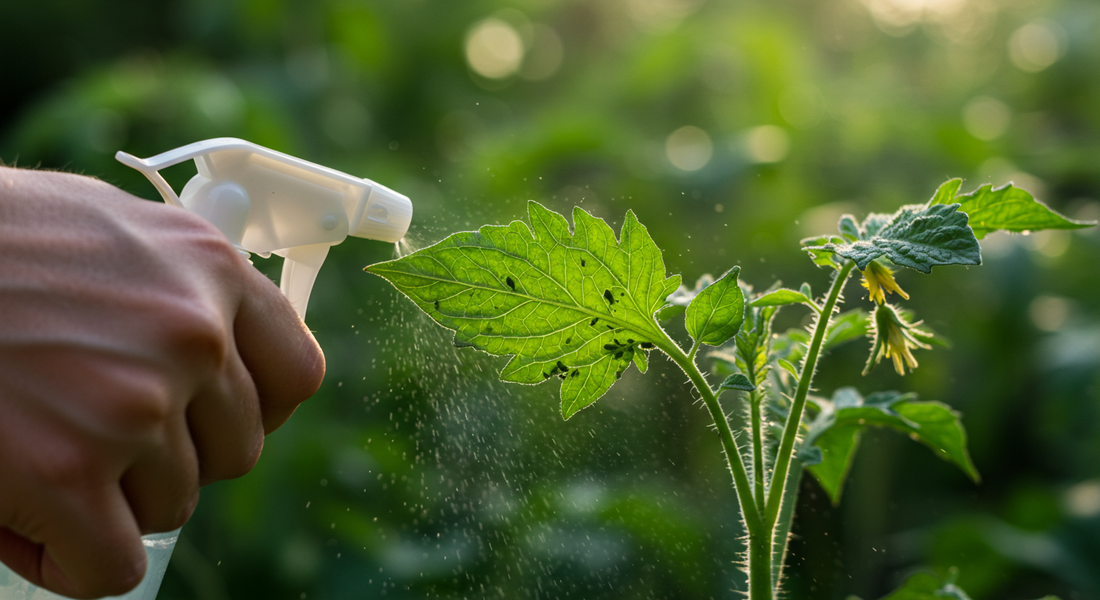
A Beginner's Guide to Organic Pest Control: 5 Natural Ways to Protect Your Garden
Share
There is nothing more rewarding than harvesting vegetables and fruits you've grown yourself. But there's also nothing more disheartening than discovering your beautiful plants have been ravaged by pests. For beginner gardeners, the immediate instinct might be to reach for a chemical spray, but there's a better, healthier way. The importance of organic pest control cannot be overstated—it protects your food, your family, your pets, and the delicate ecosystem of your backyard.
Navigating the world of garden pests can be challenging at first, but you don't need a degree in entomology to succeed. This guide will introduce you to five simple, effective, and natural ways to protect your garden.
Understanding Common Garden Pests
Before you can fight the enemy, you need to know who they are. Common garden pests include aphids, spider mites, cabbage worms, slugs, and squash bugs. The damage they cause can range from chewed leaves and stunted growth to yellowing plants and decimated harvests. Identifying the culprit is the first step toward choosing the right organic solution.

Method 1: Companion Planting - Nature's Teamwork
Companion planting is the strategic placement of different plants together to benefit one another. It's a proactive defense system that works 24/7.
-
How it Works: Some plants release chemicals or scents that repel pests. For example, the strong smell of marigolds is known to deter nematodes in the soil and other pests above ground. Others, like nasturtiums, act as "trap crops," luring pests like aphids to themselves and away from your more valuable vegetable plants.
-
Best Companion Plants:
-
Marigolds: Repel nematodes and many other insects.
-
Basil: Plant near tomatoes to repel tomato hornworms and whiteflies.
-
Rosemary: Deters cabbage moths and carrot rust flies.
-
Nasturtiums: A great trap crop for aphids.
-
Method 2: Homemade Insecticidal Soap - The Gentle Wash
One of the most effective and safest tools in your arsenal is a simple DIY pest spray. This natural insecticide is particularly effective against soft-bodied insects like aphids, mealybugs, and spider mites.
-
Recipe and Preparation: Mix 1 tablespoon of mild, pure liquid soap (like Castile soap) with 1 quart (about 1 liter) of water. It's crucial to use a soap without degreasers or detergents, as these can harm your plants.
-
Application: Pour the mixture into a spray bottle and apply directly to pests, ensuring you cover all surfaces of the plant, including the undersides of leaves. It's best to apply in the early morning or evening to prevent the sun from scorching wet leaves.
Method 3: Neem Oil - The All-in-One Solution
Neem oil is a versatile vegetable oil pressed from the fruits and seeds of the neem tree. It's a cornerstone of organic gardening.
-
Benefits: Neem oil acts as a hormone disruptor and "anti-feedant" for insects. It also works as a fungicide to combat issues like powdery mildew. It is a powerful natural insecticide that is non-toxic to birds, mammals, and beneficial insects like bees and ladybugs when used correctly.
-
How to Use: Mix 1-2 teaspoons of pure, cold-pressed neem oil and 1/2 teaspoon of mild liquid soap (as an emulsifier) with 1 quart of warm water. Shake well and spray all plant surfaces. Do not apply in direct sunlight.
Method 4: Diatomaceous Earth - The Microscopic Weapon
Diatomaceous Earth (DE) is a soft, sedimentary rock composed of the fossilized remains of tiny aquatic organisms called diatoms.
-
What it is: To us, it's a fine, soft powder. But at a microscopic level, it's incredibly sharp. It works by physically piercing the exoskeleton of insects like slugs, ants, and earwigs, causing them to dehydrate.
-
Application and Safety: Use only food-grade DE. Apply a light dusting on the soil around your plants and directly onto plant foliage when it is dry. It is non-toxic but can be a lung irritant, so wear a mask during application. It must be reapplied after rain. This is a fantastic pet safe pesticide for ground-dwelling pests.
Method 5: Attract Beneficial Insects - Hire a Bug Army
Not all bugs are bad! Beneficial insects are the predators that feast on garden pests. Creating a welcoming environment for them is like hiring a 24/7 security force.
-
Who They Are: Key players include ladybugs (which devour aphids), lacewings, praying mantises, and parasitic wasps.
-
How to Attract Them: Plant small-flowered plants like dill, fennel, cilantro, and yarrow. Provide a shallow source of water with some pebbles for them to land on. Most importantly, avoid chemical pesticides that kill these helpful allies along with the pests.
Conclusion: Embrace Sustainable Gardening
Adopting organic pest control methods does more than just save your plants. It empowers you to become a more observant and engaged gardener. By working with nature, you create a healthier, more resilient garden ecosystem. These five methods are a starting point. As you grow, so will your understanding of the intricate balance in your backyard. Happy gardening!

